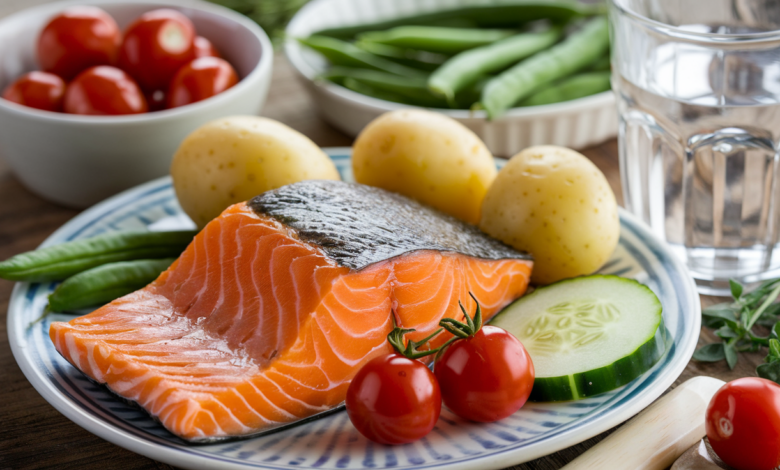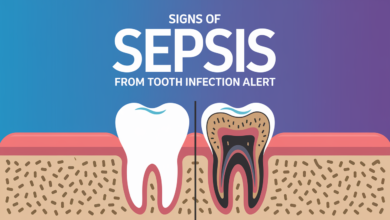Diet for Strong Teeth in Older Adults – Oral Health Tips

As we age, maintaining good oral health becomes increasingly important. A diet that supports strong teeth is essential for older adults to prevent common dental problems and maintain a healthy smile. In this article, we will explore the importance of oral health and provide tips on the ideal diet for older adults to promote dental health.
Key Takeaways:
- A proper diet plays a crucial role in maintaining strong teeth as we age.
- Seniors should focus on consuming tooth-friendly foods rich in calcium and vitamin D.
- Incorporating food that promotes saliva production and cleans the teeth naturally is beneficial for dental health.
- Practical tips, such as portion control and meal planning, can help seniors incorporate a dental health diet into their routine.
- Good oral hygiene habits, including regular brushing and flossing, are essential alongside a dental health diet.
The Role of Nutrition in Dental Health
Proper nutrition plays a vital role in maintaining dental health, especially for seniors. As we age, our teeth and gums become more susceptible to oral health issues, making it crucial to prioritize senior dental care through healthy eating habits.
Senior individuals should pay particular attention to their nutrition for teeth, as it can significantly impact their oral health. A diet rich in essential nutrients not only promotes strong teeth but also helps prevent gum disease and tooth decay.
Seniors should focus on consuming foods that provide the necessary vitamins and minerals for optimal dental health. Calcium and vitamin D are especially important to support healthy teeth, as they contribute to bone strength and tooth structure.
“A balanced and nutritious diet is key to maintaining oral health in seniors. By incorporating teeth-friendly foods into their daily intake, seniors can reduce the risk of dental problems and enjoy a healthy smile for years to come.”
Healthy eating for seniors should include a variety of foods that promote saliva production and help clean the teeth naturally. This includes fibrous fruits and vegetables, such as apples and carrots, which act as natural toothbrushes by removing plaque and debris.
Furthermore, seniors should limit their consumption of sugary and acidic foods and beverages, as they can contribute to tooth decay and enamel erosion. Opting for water or unsweetened drinks instead can significantly benefit dental health.
To provide a comprehensive guide to nutrition for teeth, the table below highlights essential nutrients and foods that support senior dental care:
| Nutrient | Food Sources |
|---|---|
| Calcium | Dairy products (milk, cheese, yogurt), leafy greens (kale, spinach, broccoli), almonds, soybeans |
| Vitamin D | Fatty fish (salmon, mackerel, sardines), fortified dairy products, egg yolks, sunlight exposure |
| Fiber | Fruits (apples, pears, berries), vegetables (carrots, celery, cucumbers), whole grains (oats, brown rice, quinoa) |
| Antioxidants | Berries, citrus fruits, nuts, green tea, dark chocolate |
By incorporating these tooth-friendly foods into their diet, seniors can proactively support their dental health and enjoy the benefits of a healthy smile.
Tooth-Friendly Foods for Strong Teeth
When it comes to maintaining strong teeth, a healthy diet plays a crucial role. For older adults, incorporating tooth-friendly foods into their daily meals is essential for senior oral care nutrition. These foods are rich in vital nutrients like calcium and vitamin D, which contribute to dental health. Additionally, certain foods promote saliva production, which helps clean the teeth naturally and prevent tooth decay. Here are some tooth-strengthening foods that seniors should include in their diet:
- Dairy Products: Milk, cheese, and yogurt are excellent sources of calcium and protein, essential for maintaining strong teeth and bones. They also help neutralize acids in the mouth that can erode tooth enamel.
- Leafy Greens: Vegetables like spinach, kale, and broccoli are packed with essential nutrients, including calcium, vitamin A, and vitamin C. These nutrients help promote gum health and strengthen tooth enamel.
- Salmon: Fatty fish like salmon are rich in vitamin D, which facilitates calcium absorption, promoting strong teeth and bones.
- Oranges: Citrus fruits, such as oranges, are high in vitamin C. This vitamin is crucial for collagen production, which helps maintain the strength and integrity of the gums.
- Carrots: Crunchy vegetables like carrots stimulate saliva production, helping to wash away food particles and promote oral hygiene. They are also rich in fiber and vitamin A, which aid in gum health.
By incorporating these tooth-friendly foods into their diet, older adults can contribute to their dental health and overall well-being. It’s important to note that a balanced and varied diet, along with regular dental check-ups and proper oral hygiene practices, is key to maintaining strong and healthy teeth as we age.
Tips for Incorporating Dental Health Diet
Maintaining a tooth-friendly diet is essential for seniors looking to promote their oral health and overall well-being. By incorporating these practical tips into your daily routine, you can ensure that your diet supports strong teeth and a healthy smile.
1. Practice Portion Control
Portion control plays a crucial role in maintaining a tooth-friendly diet. By practicing moderation and avoiding excessive consumption of sugary and acidic foods, you can reduce the risk of tooth decay and enamel erosion. Consider using smaller plates and bowls to help control portion sizes and prevent overeating.
2. Plan Nutrient-Rich Meals
A well-balanced and nutrient-rich meal plan is essential for elderly dental nutrition. Incorporate a variety of foods that strengthen teeth, including:
- Calcium-rich foods: Milk, cheese, yogurt, and leafy green vegetables.
- Vitamin D sources: Fatty fish, eggs, and fortified cereals.
- Crunchy fruits and vegetables: Apples, carrots, and celery stimulate saliva production and help naturally clean teeth.
By planning meals that include these tooth-friendly foods, you can provide your teeth with the necessary nutrients for optimal strength and overall oral health.
3. Opt for Dental-Friendly Cooking Methods
Choosing dental-friendly cooking methods can help preserve the nutritional integrity of your food while reducing potential harm to your teeth. Steaming, grilling, broiling, and baking are healthier alternatives to frying or deep-frying, as they retain more nutrients and minimize the consumption of added oils and fats.
4. Limit Sugary and Acidic Foods
Reducing the consumption of sugary and acidic foods is vital for maintaining good oral health. These types of foods can lead to tooth decay and enamel erosion over time. Limit your intake of sugary drinks, candies, desserts, and acidic fruit juices, and opt for healthier alternatives like water, unsweetened teas, and fresh fruits with neutral or alkaline pH levels.
“It’s important to strike a balance between enjoying your favorite treats and prioritizing your dental health. By making informed choices and reducing your exposure to sugary and acidic foods, you can protect your teeth from harmful effects.” – Dr. Emily Peterson, Dental Health Expert
5. Stay Hydrated
Proper hydration is crucial for maintaining good oral health. Water helps stimulate saliva production, which helps neutralize acids and wash away food particles that can contribute to plaque buildup. Make sure to drink an adequate amount of water throughout the day to keep your mouth hydrated and your teeth protected.
By following these tips and incorporating a tooth-friendly diet into your lifestyle, you can support your oral health and maintain strong teeth well into your golden years.
Maintaining Good Oral Hygiene Habits
Alongside a dental health diet, it is crucial for seniors to prioritize maintaining good oral hygiene habits. These habits play a vital role in preventing dental issues and promoting overall oral health. Here are some essential practices that seniors should incorporate into their daily routine:
- Proper Brushing Technique: Seniors should brush their teeth at least twice a day using a soft-bristled toothbrush. It is important to brush all surfaces of the teeth, including the gums, and to use gentle, circular motions to avoid gum irritation.
- Flossing Regularly: Regular flossing helps remove food particles and plaque from between the teeth and along the gumline. Seniors should floss at least once a day, using a gentle back-and-forth motion and being careful not to snap the floss against the gums.
- Regular Dental Check-ups: Seniors should schedule regular dental check-ups and cleanings with their dentist to detect any dental issues early and receive appropriate treatment. These visits also provide an opportunity to discuss oral hygiene concerns and receive personalized advice.
- Using Mouthwashes: Mouthwashes can be a valuable addition to oral hygiene routines as they help kill bacteria and freshen breath. Seniors should look for alcohol-free mouthwashes that are specifically formulated for their age group.
Additionally, using dental products that are specifically designed for older adults can provide added benefits for senior oral hygiene. These products address common issues such as dry mouth and sensitivity, providing targeted care and support.
“Maintaining good oral hygiene habits is crucial for seniors to prevent dental issues and promote overall oral health.”
By combining a dental health diet with proper oral hygiene habits, seniors can significantly improve their dental health and maintain strong teeth as they age.
| Benefits of Maintaining Good Oral Hygiene Habits: |
|---|
| Prevents tooth decay |
| Reduces the risk of gum disease |
| Prevents bad breath (halitosis) |
| Promotes healthy gums |
| Enhances overall oral health and well-being |
Conclusion
In conclusion, maintaining strong teeth in older adults requires a proper diet and good oral hygiene habits. Nutrition plays a crucial role in dental health, and seniors should prioritize a dental health diet to promote strong teeth. A diet rich in calcium, vitamin D, and other essential nutrients is essential for maintaining dental health in older adults.
By incorporating tooth-friendly foods such as dairy products, leafy greens, and lean proteins into their meals, seniors can provide their teeth with the necessary nutrients for strength and resilience. Additionally, seniors should focus on foods that promote saliva production and aid in natural teeth cleaning, such as crunchy fruits and vegetables.
However, proper nutrition alone is not enough. Seniors must also maintain good oral hygiene habits, including regular brushing, flossing, and dental check-ups. Using dental products specifically designed for older adults can further enhance oral health. It’s essential for seniors to prioritize their dental health and seek professional advice when needed to ensure strong teeth and overall well-being.
FAQ
What role does nutrition play in dental health?
Nutrition plays a significant role in maintaining dental health. Consuming a balanced diet that is rich in essential nutrients, such as calcium and vitamin D, helps strengthen teeth and promote oral health.
What are some tooth-friendly foods that older adults should include in their diet?
Older adults should include foods that are high in calcium, such as dairy products and leafy greens, to promote strong teeth. Foods rich in phosphorus, such as lean meats and eggs, also contribute to dental health. Additionally, incorporating foods that promote saliva production, like apples and carrots, can help clean the teeth naturally.
How can seniors incorporate a dental health diet into their daily routine?
Seniors can incorporate a dental health diet by practicing portion control, meal planning, and cooking methods that retain the nutritional value of foods. It is also important to avoid sugary and acidic foods and beverages that can damage tooth enamel.
What are some tips for maintaining good oral hygiene habits alongside a dental health diet?
Alongside a dental health diet, it is important to brush teeth at least twice a day using a fluoride toothpaste and floss regularly to remove plaque and food particles. Seniors should also schedule regular dental check-ups and consider using dental products specifically designed for older adults.
Why is it important for older adults to prioritize their oral health?
Older adults are more susceptible to dental problems due to aging, medication use, and certain health conditions. Prioritizing oral health can help prevent tooth decay, gum disease, and other dental issues, leading to overall better oral health and quality of life.

